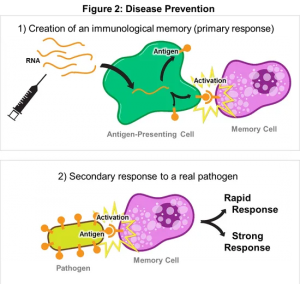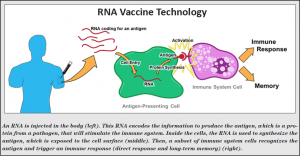Summary


Benefits
Benefits of mRNA vaccines over conventional approaches are1:
Pfizer and Moderna 都是mRNA类型疫苗,几个关键点。只要一旦突破技术点,几个大厂只不过是先后做成功了。
这次的mRNA确实是疫苗的革新,以后不用灭活这种低效率的疫苗方式了.
Source from https://www.phgfoundation.org/briefing/rna-vaccines
- Unlike a normal vaccine, RNA vaccines work by introducing an mRNA sequence (the molecule which tells cells what to build) which is coded for a disease specific antigen, once produced within the body, the antigen is recognised by the immune system, preparing it to fight the real thing
- RNA vaccines are faster and cheaper to produce than traditional vaccines, and a RNA based vaccine is also safer for the patient, as they are not produced using infectious elements
- Production of RNA vaccines is laboratory based, and the process could be standardised and scaled, allowing quick responses to large outbreaks and epidemics


Benefits
Benefits of mRNA vaccines over conventional approaches are1:
- Safety: RNA vaccines are not made with pathogen particles or inactivated pathogen, so are non-infectious. RNA does not integrate itself into the host genome and the RNA strand in the vaccine is degraded once the protein is made.
- Efficacy: early clinical trial results indicate that these vaccines generate a reliable immune response and are well-tolerated by healthy individuals, with few side effects.
- Production: vaccines can be produced more rapidly in the laboratory in a process that can be standardised, which improves responsiveness to emerging outbreaks.
Pfizer and Moderna 都是mRNA类型疫苗,几个关键点。只要一旦突破技术点,几个大厂只不过是先后做成功了。
这次的mRNA确实是疫苗的革新,以后不用灭活这种低效率的疫苗方式了.
Source from https://www.phgfoundation.org/briefing/rna-vaccines